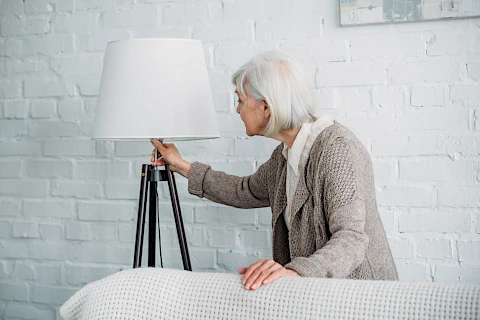
As we age, our eyes undergo several changes that can affect our vision, especially at night. For seniors, these changes can influence their safety and independence. Caregivers need to understand and help seniors with changes in night vision. This blog will guide you on how to help seniors with age-related night vision changes.
Night Vision Changes in Seniors
With advancing age, our eyes' ability to see in low light diminishes. Common causes of night vision changes include cataracts, glaucoma, and reduced pupil size. Symptoms to watch for include difficulty seeing at night, trouble adjusting to bright lights, and increased sensitivity to glares. These changes can affect daily life, making tasks like reading or navigating stairs more challenging and potentially hazardous.
Ensuring Adequate Lighting in the Home
Proper lighting at home is crucial for seniors experiencing night vision changes. Good lighting can prevent falls and make daily activities easier. You want to make sure the living room has bright, even lighting. Use lamps with adjustable brightness to cater to different needs. Install bedside lamps with easy-to-reach switches, and consider using soft, diffused lighting to minimize glare. You want to ensure hallways and stairs are well-lit and use bright, motion-sensor lights to improve visibility. Bathrooms should have bright lighting. Consider using night lights to help with nighttime bathroom trips.
Using Night Lights Effectively
Night lights can be very beneficial for seniors. They provide enough light to navigate without tripping but aren't too bright to disturb sleep. Place night lights in hallways, along stairs, and in bathrooms. These are high-traffic areas where seniors need the most visibility at night. You want to look for night lights with motion sensors or low-glow LEDs. These types are energy-efficient and can provide adequate lighting without being too harsh. Routine eye exams help to detect and manage vision changes. Encourage seniors to schedule annual eye exams. These check-ups can help detect conditions like cataracts or glaucoma early. Seniors should tell their eye care professional about any vision concerns.
Assisting With Challenging Activities in Low Light
Some activities become more challenging for seniors in low-light conditions. You can offer magnifying glasses or reading lights to help seniors read comfortably. Kindles and tablets with adjustable backlighting can also be helpful. Ensure stairs are well-lit from top to bottom. Install handrails on both sides of the stairs for added safety. For other activities like cooking or hobbies, use task lighting. Bright, focused lights can make a big difference.
Senior Helpers Huntsville Helps Keep Seniors With Night Vision Safe
Supporting seniors with night vision changes involves several strategies. Ensuring adequate lighting in the home, using night lights effectively, encouraging regular eye check-ups, and assisting with challenging activities are all steps you can take. Proactive care and support can significantly enhance the quality of life for seniors. If you need assistance supporting seniors with night vision changes in Huntsville, Madison, Meridianville, Hazel Green, and Brownsboro, contact Senior Helpers Huntsville.